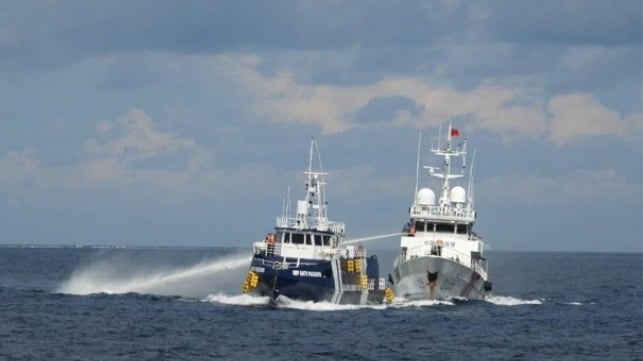China Uses Water Cannons and Rams Philippine Vessel in New Confrontations

China and the Philippines are again trading accusations after two incidents in the South China Sea in the area of the Spratly Islands. No one was injured, and the supply missions were completed, after what the Philippines called “dangerous and provocative maneuvers” by the Chinese that included the use of water cannons and what was being termed a “deliberate ramming” of a Philippine government vessel.
China is calling the actions by the Philippines “violations and provocations,” with a spokesperson on Monday saying the Philippines must stop its actions. China asserts that it has established a marine reserve in the area, and the Philippines reports that the Chinese vessels asserted that the Filipino fishermen are harming the environment. The Philippines responds that the areas are in its EEZ, and only it has the right to determine environmental protection efforts.
The latest provocations began with a resupply mission on October 8. The Philippines reported that an overflight of the area the prior day revealed a considerable presence of Filipino fishing boats. According to a spokesperson from the Philippine Coast Guard, this mission encountered a series of intimidation tactics, including a warning of a live fire exercise from the Chinese. They reported that there was an “increased Chinese maritime presence,” as well as overflights targeting both the fishermen and the Philippine government vessels, but the resupply was completed.
PCG and BFAR Stand Firm Against Chinese Bullying and Aggressive Actions in Pag-asa
— Jay Tarriela (@jaytaryela) October 12, 2025
The Philippine Coast Guard (PCG) and the Bureau of Fisheries and Aquatic Resources (BFAR) have reaffirmed their strong commitment to protecting Filipino fishermen in the Kalayaan Island Group,… pic.twitter.com/okA55L9oWs
A second mission on Saturday, October 11, however, encountered more direct aggression from the Chinese vessels. The Philippines asserts that the China Coast Guard and Chinese Maritime Militia activated their water cannons and undertook the “dangerous and provocative maneuvers.” China Coast Guard vessel 21559 fired its water cannon against the BRP Datu Pagbuaya and then three minutes later “deliberately rammed” the stern of the Filipino vessel. The Philippines reports minor structural damage.
Today, October 13, the Philippines was conducting two further supply missions in the area of the Spratly Islands, including near Thitu, where the Philippines maintains forces and is frequented by the fishing vessels. Vessels from the China Coast Guard and Chinese Maritime Militia again came dangerously close and undertook blocking actions, says Jay Tarriela of the Philippine Coast Guard.
At the first location today, Tarriela says there were 11 China Coast Guard vessels and 11 from the militia, plus a PLA helicopter and three PLA navy vessels. The Chinese asserted the Filipinos were in their “environmental reserve.”
PCG and BFAR Deliver Supplies to Filipino Fishermen in Bajo de Masinloc and Escoda Shoal Amid Chinese Harassment
— Jay Tarriela (@jaytaryela) October 13, 2025
The Philippine Coast Guard (PCG) and the Bureau of Fisheries and Aquatic Resources (BFAR) successfully distributed fuel subsidies, food supplies, and crushed ice to… pic.twitter.com/arWMn4awOA
The second incident of the day involved 10 China Coast Guard vessels, 10 militia vessels. A PLA helicopter, two PLA Navy vessels, and a high-speed response boat were all used in attempts to block the Filipino vessels. Again, the Chinese activated their water cannons, but Tarriela reports the Philippine Coast Guard vessels BRP Melchora Aquino and BRP Cabra supported five Bureau of Fisheries patrol boats that were able to complete the supply mission. The Philippine government is also buying the catch from the fishermen.
"My top priority is to safeguard their livelihoods from any interference by the China Coast Guard and to ensure their rights as Filipinos are never suppressed by external bullying,” said Admiral Ronniel Gil Gavan, PCG Commandant, after today’s incidents. “We stand firmly with President Ferdinand Marcos Jr. in defending every square inch of our sovereign territory against any foreign power."

that matters most
Get the latest maritime news delivered to your inbox daily.
A spokesperson for China’s Foreign Ministry urged the Philippines to stop their “provocations.” They said the responsibility “lies entirely with the Philippine side,” and that China will continue to defend its territory.
The global community quickly issues new statements condemning the Chinese actions and supporting the Philippines. Ambassadors from the United States, the UK, EU, Australia, and Japan all called for China to respect and follow international law and rules and to stop its aggression against the Filipino vessels.
